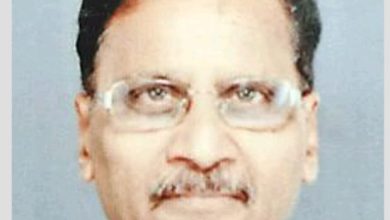Recapping 2023 and Paving the Way for 2024

Yash Pal Ralhan
The year 2023 has come to a close, prompting citizens across India to engage in a time-honoured tradition—reflecting on the past year’s events while looking ahead to what the future holds. This practice becomes even more pertinent as the nation prepares for upcoming parliamentary elections that will shape India’s destiny. As the clock ticks down to the final moments of the year, the entire country is gearing up for a grand celebration in Ayodhya, with numerous programs planned in connection with the inauguration of the Ram Temple on January 22. For every citizen, adopting a balanced approach of “looking back and looking ahead” is not just a tradition but a necessity. It is heartening to read about the many successes of our nation. One such moment of pride was the successful completion of Chandrayaan 3’s mission, showcasing our country’s remarkable progress in the field of technology and space exploration.
While we celebrate our achievements, it is equally essential to address pressing issues. The question arises as to why a significant number of Indians are willing to spend enormous sums of money and take desperate risks to migrate illegally to more affluent countries. This issue deserves our attention and calls for comprehensive solutions.
The government’s decision to extend the free food grain program for 800 million people by another five years reflects its commitment to ensuring food security for the vulnerable sections of our society. This initiative, along with other welfare programs, underscores the government’s dedication to improving the lives of its citizens.
The current government has made substantial investments in the country’s infrastructure and digital economy, enhancing India’s prestige on the global stage. However, there are concerns raised by opposition forces regarding media intimidation, pressure on civil society, and legal actions against leaders from opposing parties, which have led to debates about democratic backsliding.
It is worth noting that no Indian leader has won a third term at the polls since Jawaharlal Nehru in 1962. While the ruling party has a stronghold in the country’s poorer, populous northern states, it faces challenges in wealthier southern states. As we move forward, minority rights may come into focus, depending on the ruling party’s pursuit of a majoritarian agenda.
Looking ahead requires us to acknowledge the country’s contradictions and work diligently to address problem areas. It is crucial to focus on improving the quality of life for every Indian, ensuring that progress is inclusive and not limited to a select few.
Recent headlines in the global media have highlighted India’s emergence as a stock market superpower and a significant player on the world stage, especially in the digital realm. India boasts the largest number of users on platforms like Facebook, Instagram, and YouTube, opening new avenues for global engagement.
The Unified Payments Interface (UPI) has played a pivotal role in driving India’s digital payments revolution. UPI transactions have surged remarkably, reaching an astonishing 8,572 crore by December 11, 2023. However, India also ranks among the countries with the highest number of Internet shutdowns, emphasizing the existence of a digital divide.
India’s connectivity has grown substantially, but disparities persist. Challenges include inadequate infrastructure, affordability issues, and low digital literacy. Additionally, a global comparison reveals that the percentage of female Internet users in India lags behind other regions.
Currently, India holds the position of the world’s fifth-largest economy, with aspirations to become the third-largest by 2030, according to S&P Global Ratings. As we navigate an election year and beyond, we must shift our focus to per capita income and the quality of life for every Indian citizen.
While impressive economic statistics may be touted, it is essential to address the daily challenges faced by those who experience discrimination and indignities. Our nation’s progress should be measured not only by GDP but also by the well-being of its citizens.
In the philosophical context, life is a tapestry of ups and downs, happiness and sorrow, peace and conflict. As Prime Minister Modi wisely stated, “it is no time for war,” yet conflicts persist globally, including the ongoing crises in Ukraine and Gaza.
Turning to brighter aspects, India hosted an immensely successful G-20 Summit in Delhi, where world leaders reached a consensus statement despite differing opinions on the Ukrainian war. Indian leadership was praised for its diplomatic skills, showcasing our nation’s prowess on the global stage.
This year, India achieved the status of the world’s fifth-largest economy, a significant milestone considering our historical growth challenges. However, our per capita GDP remains among the lowest in the G-20.
Simultaneously, India has become the world’s most populous country, surpassing China. This demographic advantage can be a boon if harnessed intelligently for our nation’s development.
Caution is warranted as the US Commission on International Religious Freedom (USCIRF) has identified India as one of the countries of particular concern due to concerns about religious freedom. It is imperative to address issues related to religious tolerance and accommodation, which are integral to India’s identity as a secular nation.
India’s rankings in democracy assessments by organizations such as Freedom House, V-Dem, and Economist Intelligence Unit have raised concerns. While there may be debates about the methodologies used, any shortcomings in India’s political and societal landscape should not be disregarded lightly.
The World Happiness Report 2023 ranks India 126th out of 137 countries, highlighting the need for attention to the well-being and happiness of our citizens. As we step into 2024 and beyond, these concerns should be addressed with the same vigor as our economic achievements.
In recent years, Indian diplomacy has demonstrated its strength, as seen in the successful commutation of death sentences to jail terms in Qatar due to the Indian government’s pressure. This showcases India’s influence on the global stage.
As India looks ahead to 2024 and beyond, it must strike a balance between celebrating its achievements and addressing its challenges. Economic growth and global recognition are commendable, but they should not overshadow the pressing issues within the nation. In the coming years, India must work tirelessly to bridge socio-economic disparities, uphold democratic values, and ensure the well-being of all its citizens. A nation’s greatness is not solely measured by economic indicators but by the quality of life it provides to each of its people. As the calendar turns, India’s journey continues, guided by its principles of democracy, secularism, and inclusive progress.





